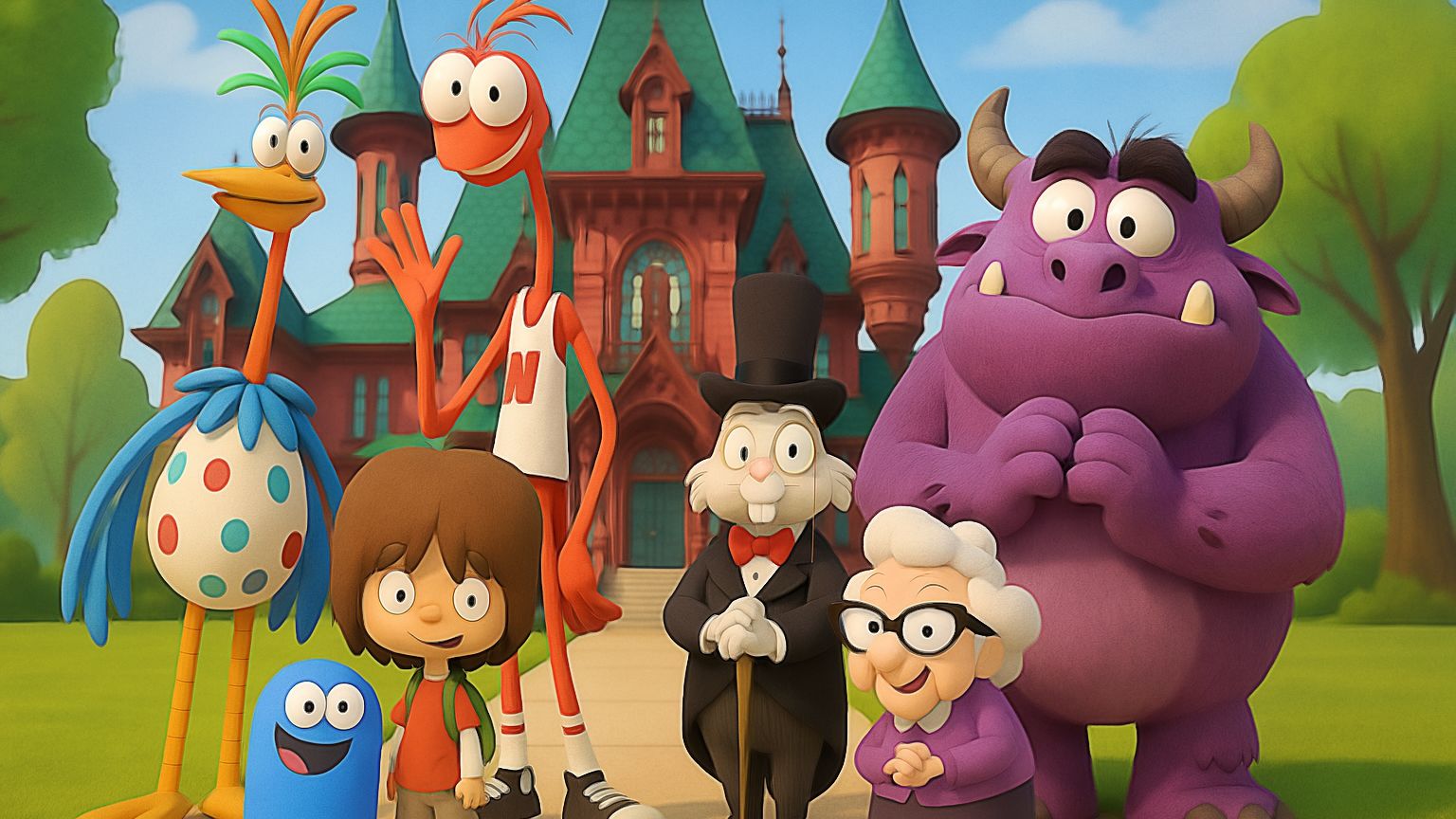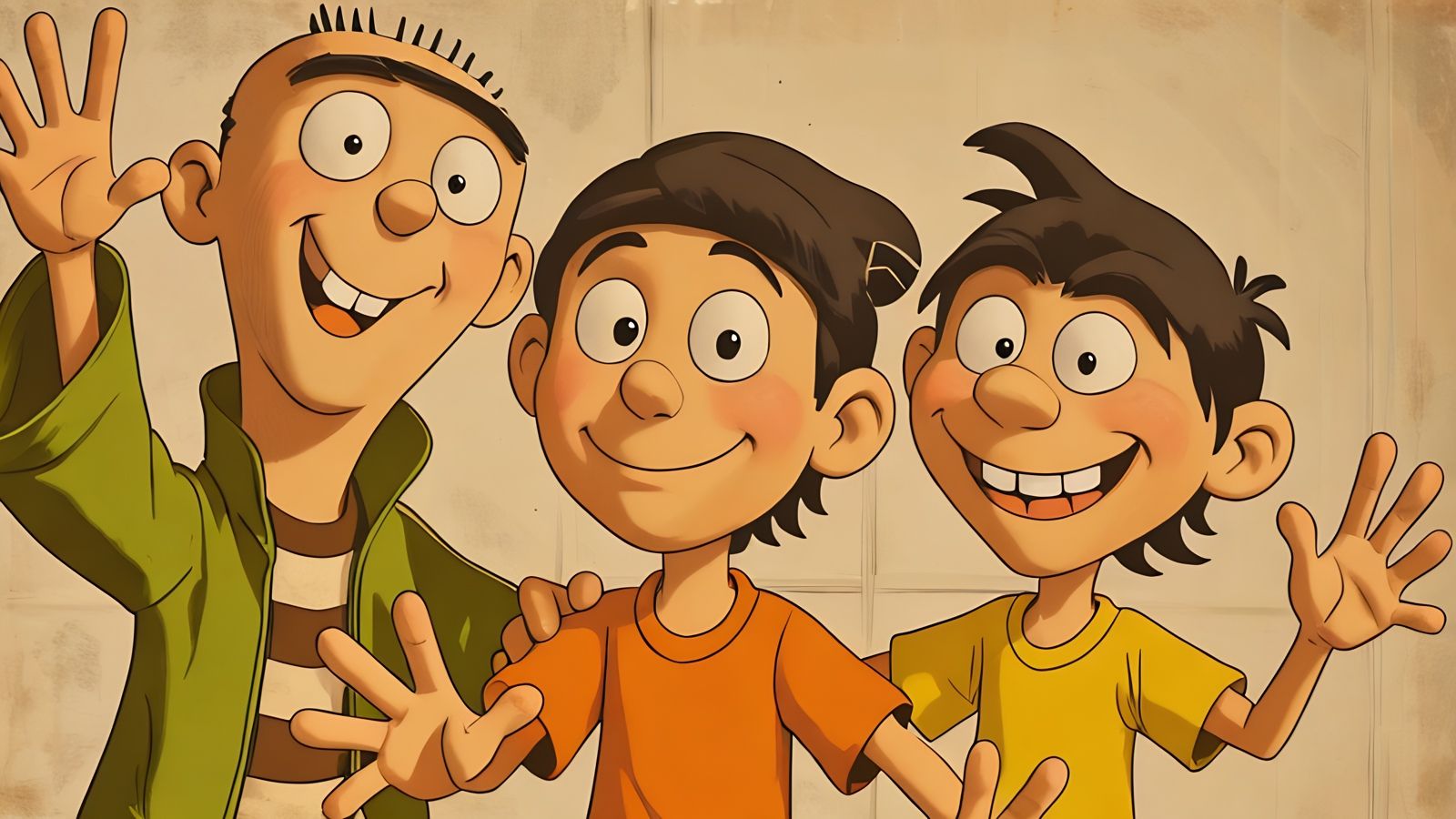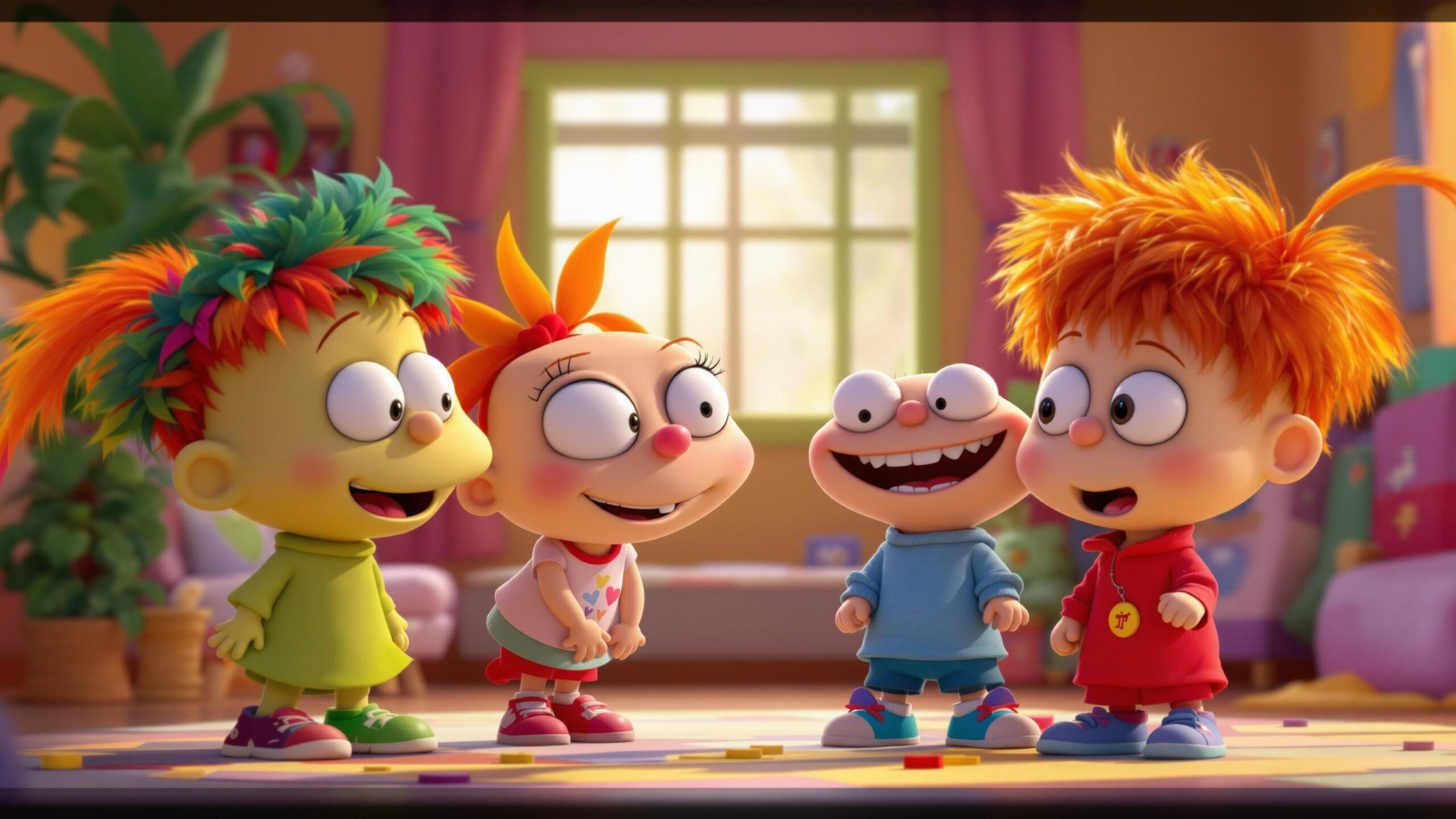Welcome Back to Foster’s
If you grew up watching Foster’s Home for Imaginary Friends, you probably remember the whimsical animation, the goofy characters, and the chaotic humor. But rewatching the show as an adult? That’s a whole new experience. What once felt like zany cartoon nonsense is now laced with emotional depth, clever satire, and an appreciation for just how brilliantly crafted Craig McCracken’s series really was.
Foster’s was always more than a show about make-believe friends. It was a series about loneliness, creativity, growing up, and the wild weirdness of childhood—and now that we’ve got a few years under our belts, these episodes hit differently. So, whether you’re back for the nostalgia, or just need a break from adulting, here are the Foster’s episodes that are even better with age.
Season 1, Episode 1: House of Bloo’s
This is where it all began. The pilot episode doesn’t just introduce us to the concept of a home for imaginary friends—it introduces us to one of the most delightfully chaotic cartoon ensembles ever created. Watching this episode as a kid, you’re mostly focused on the action: Blooregard trying to avoid being adopted, Mac being the most loyal 8-year-old ever, and Madame Foster skateboarding through hallways like a 90-year-old menace.
As an adult? You realize just how smart the episode is. It tackles the bittersweet idea of outgrowing your imagination with a surprising amount of emotional complexity. The moment Mac has to decide whether to give Bloo up for adoption or not stings a little more now, especially when you think about all the things we’ve left behind since childhood. Also, shout-out to Mr. Herriman’s passive-aggressive rabbit energy, which is way more relatable now that we’ve all worked in an office.
Season 2, Episode 3: Mac Daddy
You probably laughed at Cheese’s debut when you were younger. His unforgettable chant— “I like chocolate milk!”—echoed across playgrounds and cafeteria tables everywhere. But watching “Mac Daddy” as an adult? It feels like a surprisingly layered portrait of anxiety, responsibility, and that universal fear: am I ready to be in charge of something?
When Mac thinks he might have created Cheese in his sleep, it throws him into a full-blown existential panic. Sound familiar? Because it should. Whether it’s accidentally adopting a pet, taking on a new job, or just realizing you’ve overcommitted, Mac’s chaos feels weirdly accurate. Cheese, meanwhile, is the unfiltered embodiment of everything unpredictable about life. He’s lovable, exhausting, and impossible to ignore—just like the best and worst parts of growing up.
Also, Cheese has never been funnier. As adults, we now realize that “random nonsense” was actually perfect comedic timing.
Season 2, Episode 9: Bloo’s Brothers
There are a lot of things Bloo isn’t—quiet, humble, or particularly self-aware—but in “Bloo’s Brothers,” we get to see him pushed to his limits in the best and funniest way possible. The plot? A ton of Bloo clones show up at Foster’s, and each one is more chaotic, selfish, and hilariously unhinged than the last. If you ever wanted a peek into Bloo’s psyche, this is it—just multiplied by twenty.
As a kid, you probably laughed at the absurdity. Bloo arguing with himself? Silly. The clones fighting over who’s the real Bloo? Classic. But as an adult, this episode becomes a brilliant piece of self-commentary. Watching Bloo deal with versions of himself that reflect his worst traits is both comedy and catharsis. Every obnoxious tic, every ego trip, every lie he’s told—it all comes back to haunt him in the form of bickering duplicates.
Also, it’s weirdly relatable. Who hasn’t had that moment of reckoning where they realized they might be their own worst enemy? Whether it’s overcommitting, making excuses, or just being too much, “Bloo’s Brothers” makes it hysterically clear that self-awareness is a journey. Watching Bloo try to outsmart his own brainchildren while pretending he’s totally in control is painfully funny—and painfully real.
By the end, Bloo learns a little something about himself… emphasis on little. But it’s okay. He’s Bloo. Self-improvement comes in tiny, sugar-fueled doses. And seeing him try is half the joy.
Season 3, Episode 1: Goodbye to Bloo
Let’s just rip the emotional band-aid off early. This episode is brutal—in the best way. “Goodbye to Bloo” explores what happens when you think someone you love has moved on without you. Mac assumes Bloo’s been adopted and spends the episode trying to come to terms with the possibility of saying goodbye.
Watching this as a kid? Sad. Watching this as an adult? Devastating. It’s a beautifully crafted episode about friendship, communication, and how misunderstandings can spiral into full-blown heartache. Bloo’s cluelessness is funny at first, but Mac’s quiet sadness hits harder now, especially when you realize how much the show subtly explores abandonment and change.
It’s also a lesson in perspective. When you’re young, the idea of separation feels scary. As an adult, it’s haunting. But then, Bloo pops back up, clueless and chaotic as ever, and you’re reminded that sometimes, the people you love are never really gone—they’re just a little late getting snacks.
Season 3, Episode 5: Squeeze the Day
Every now and then, Foster’s ditches the emotional weight and just delivers pure, perfect chaos. “Squeeze the Day” is an adult rewatch must simply because it’s one of the funniest, weirdest, and most unhinged episodes in the entire series.
The premise? Mac and Bloo are left home alone and get the bright idea to use up every drop of house privileges in one day—TV, pizza, pool time, you name it. The result is a descent into absolute anarchy. Watching it now, you can’t help but laugh at the extreme escalation. What starts as mild mischief turns into full-blown destruction—and somehow, it’s still charming.
As kids, we saw it as wish fulfillment: what if you could do anything for a day? As adults, it’s a hilarious parody of excess, burnout, and what happens when you let your inner child run unchecked for 24 hours. It’s basically a sugar high in episode form.
Also, who among us hasn’t tried to cram a month of fun into a single Saturday, only to end up lying on the floor in a pizza coma? Exactly.
Season 4, Episode 6: Frankie My Dear
Let’s talk about Frankie Foster. As kids, she was the “cool adult”—laid-back, friendly, and slightly exasperated. As adults? She is the unsung hero of the entire series. And no episode captures her plight better than “Frankie My Dear.”
This is the episode where Frankie tries to go on a date, only to be blocked at every turn by an army of imaginary friends—and one very possessive Goo. Watching this as an adult is like watching your own plans fall apart because everyone needs something from you at the exact wrong time. Frankie just wants one night to herself. Is that so much to ask?
The humor in this episode is top tier, but the real gem is how it taps into the feeling of being the responsible one. Frankie carries the mental load of the entire house, and the episode doesn’t shy away from showing just how exhausting that is. It’s chaotic, funny, and quietly validating for anyone who’s ever just wanted a break.
Season 5, Episode 2: I Only Have Surprise for You
Surprise parties. Great in theory, complete nightmares in execution. “I Only Have Surprise for You” captures this perfectly, with Bloo going full tyrant to ensure Mac’s surprise birthday goes off without a hitch—only he doesn’t actually know what he’s doing.
This episode is comedy gold from start to finish. Bloo micromanages the guests, bans Mac from entering certain rooms, and builds increasingly ridiculous obstacles to keep the party a secret. Meanwhile, Mac is just trying to have a normal day. Watching this as an adult, it becomes clear: Bloo is every overzealous party planner ever, and Mac is all of us who just wanted cake and quiet.
The episode also delivers a stealthy commentary on expectations vs. reality. Bloo’s vision is elaborate, excessive, and unachievable—just like the Pinterest boards of every stressed-out birthday host. The chaos is relatable, the execution is hilarious, and the payoff. Worth it. Just maybe don’t let Bloo plan your next get-together.
Season 5, Episode 6: The Big Picture
One of the most lowkey emotional punches in the series, “The Big Picture” is about a simple idea that hits hard as an adult: the importance of memories—and what happens when they fade. The episode revolves around Madame Foster gathering everyone to take the annual house photo, a tradition that Bloo immediately tries to sabotage in his usual fashion. What follows is a chaotic hunt for a misplaced camera, a series of increasingly wild photoshoots, and one giant reminder of why the show matters so much.
As kids, we saw it as funny and lighthearted. But rewatching it now, you realize just how meaningful the theme of preserving moments is. Frankie, always the overworked caretaker, desperately wants everything to go right. Mac is trying to wrangle Bloo, who’s too caught up in his own fun to notice the significance. But Madame Foster? She’s quietly watching the house she built continue to grow, change, and age—and all she wants is one photo to remember it by.
It’s sweet. It’s funny. It’s a little bit sad. And it’s exactly the kind of moment that hits different when you’ve got a little life experience under your belt. We all want to hold onto things that are slipping away—friends, routines, little pockets of joy that might not last forever. “The Big Picture” doesn’t get flashy with that message. It just lets it simmer underneath the goofiness until you suddenly realize your eyes are misty and you’re smiling anyway.
Also, side note: the group photo montage at the end is one of the most heartwarming closings in the whole series. That’s a fridge-worthy moment.
Season 6, Episode 5: Destination Imagination
This two-part TV movie is a masterpiece—hands down one of the most ambitious and artistically daring episodes in the series. “Destination Imagination” follows Frankie as she stumbles into a hidden room in the house, one that holds a forgotten imaginary friend who’s been left alone for years.
As a kid, this episode felt like a wild fantasy journey with cool visuals. As an adult? It’s haunting. The forgotten friend is lonely, desperate for attention, and emotionally stuck in a world that never evolved. Sound familiar? It’s a striking metaphor for unacknowledged emotions, neglected creativity, and what happens when we bottle up our inner voice for too long.
The visuals are stunning, the tone is deeply introspective, and the story is one of the most mature things the show ever did. It’s a reminder that imagination doesn’t just disappear when we grow up—but it can get lost. “Destination Imagination” asks: are we still listening to our inner child, or did we lock them in a box years ago?
It’s a powerful, beautiful, and yes, totally rewatch-worthy episode that hits differently with adult eyes.
Why These Episodes Matter More Now
Rewatching Foster’s as an adult isn’t just fun—it’s weirdly healing. The show always knew its audience was growing up, and it never talked down to us. Beneath the slapstick, color, and chaos, there was always a current of emotional honesty, satire, and real-world commentary.
As adults, we now are Frankie. We feel Mac’s anxiety. We understand why Bloo is both infuriating and brilliant. We remember what it was like to lose our imaginary friends—or to wish we still had them. These episodes remind us of that. They pull the curtain back on what it means to grow up, miss the past, and still carry pieces of it with you.
And most importantly, they remind us it’s okay to laugh at the messiness of it all.
Fosters as a Time Capsule
Now that we’ve revisited these episodes, it’s clear that Foster’s Home for Imaginary Friends is more than just a great cartoon—it’s a time capsule of what it meant to be a kid, and what it means to reflect on that as an adult. The show doesn’t just age well—it matures with you. What once looked like colorful chaos now feels like a loving tribute to imagination, identity, and the weird beauty of growing up.
There’s something magical about a series that can make you laugh out loud at slapstick one minute, then hit you with a surprisingly deep metaphor about isolation or responsibility the next. Foster’s knew its audience wasn’t static. It knew the kids watching would eventually grow into teens, then adults, then parents themselves. And it left space in its stories for that entire journey.
Characters like Mac remind us of the pressure to be good and grown-up before we’re ready. Bloo reflects the id in all of us that just wants fun, attention, and dessert first. Frankie? She’s everyone who’s ever tried to hold it all together and felt stretched too thin. And Madame Foster? She’s a love letter to joy, memory, and the wild ride that is life—on a skateboard, no less.
Rewatching as an adult doesn’t ruin the magic. It enhances it. You get the jokes you missed. You catch the nuance. And you start to realize that the imaginary friends weren’t just silly characters—they were stand-ins for feelings, relationships, even the little corners of our minds we forgot we needed.
So yes, it’s time. Pull up the old intro. Let the piano notes roll in. Revisit the laughter, the weirdness, the chaos, and the comfort. These episodes are more than nostalgic—they’re personal. Because even if we’ve outgrown our imaginary friends, we haven’t outgrown what they meant to us.




